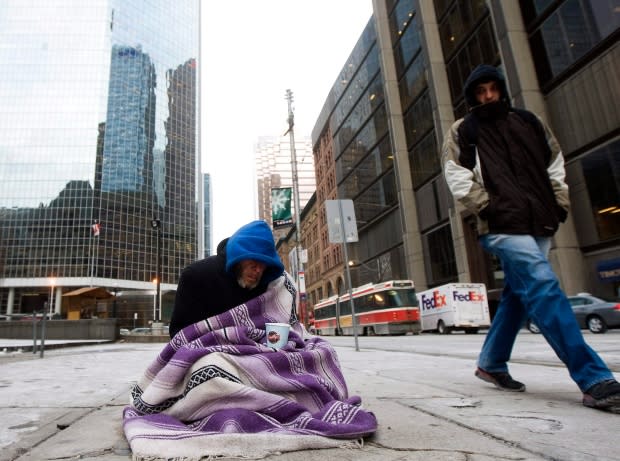'Today we say enough': New homelessness advocacy group calls for state of emergency as shelters near capacity
Homeless and housing advocates, health-care workers, shelter providers and other experts are warning of a growing homelessness problem in the city that they would like declared a state of emergency, and on Thursday launched a new organization aimed at pressuring all levels of government to step up action on the file.
Long-time homeless advocates, such as street nurse Cathy Crowe, and city councillors like Kristyn Wong-Tam, were at city hall Thursday morning to unveil the Shelter and Housing Justice Network (SHJN), not unlike the Toronto Disaster Relief Committee (TDRC) from 20 years ago.
Steve Meagher of the Christie Refugee Welcome Centre, said the group will advocate for both short- and long-term solutions to homelessness and housing from all three levels of government.
"For many years — for many, many years — we have continued to raise concerns about the suffering that homelessness inflicts upon our city's most vulnerable residents," Meagher told reporters.
"And for far too long we have heard our political leaders acknowledge that we must do better when it comes to addressing homelessness. And yet, despite this recognition, the crisis has only continued to worsen, with the impacts becoming more widespread and severe. Today we say enough."
A spokesperson for Mayor John Tory says the mayor has repeatedly expressed his support for adding additional capacity to the shelter system and opening more 24-hour respite sites.
"The mayor and city council have made investments in the shelter system and continue to call on both the provincial and federal governments to invest more in supportive housing and mental health initiatives," Don Peat said.
'It's crowded. It's not healthy'

Twenty years ago, when the TDRC was formed, there were an estimated 200,000 people who were homeless across Canada and about 5,000 in the City of Toronto, according to Crowe. Since then, both of those numbers have nearly doubled.
Before the news conference, Crowe spoke to CBC Radio's Metro Morning, and said among the group's demands is that the City of Toronto declare a state of emergency over the homelessness crisis. Crowe believes that such a move would compel the provincial and federal government to make more resources available to the city.
The city's shelters have been operating at well over the 90 per cent capacity mark set by councillors, and nearly 1,000 people are in the overflow system, which includes respite centres and overnight drop-in centres that are not meant to replace shelter services. Those spaces often do not include things like adequate bathroom and shower facilities, and have only mats on the floor for people to sleep on.
"It's crowded. It's not healthy. There's a lot of violence and tension," Crowe told Matt Galloway.
"These facilities often have disease outbreaks, including Strep A, flu and even tuberculosis, she said, "and when that happens, it's hellish, to say the least."
Some overflow sites are not equipped to offer 24-hour service, she noted, but do so in order to meet the demand. Others were not meant to stay open year-round, she added, but have.
Crowe said declaring a state of emergency over homelessness might unlock emergency funds to supplement rent, and speed up plans for more social housing or housing geared to income.
SHJN's mandate, Meagher said, is to: ensure the safety, dignity and autonomy for those experiencing homelessness, ensure access to housing for all, advocate for a national social housing program in Canada to be re-established, and to enhance access to critical services and supports.
In addition to the state of emergency declaration, the group has five other demands:
That the City of Toronto declare a state of emergency over the opioid crisis, which is also affecting those who are homeless.
That the city open the Sprung Instant Structures (temporary shelters) to not only create more spaces but in particular to help women and members of the LGBT community.
That the city open 1,000 more shelter beds in 2019 to ease overcrowding.
That the city commit to opening 100,000 rent-geared-to-income housing units over the next five years.
That all levels of government commit to investing one per cent more of their existing budgets in tackling housing and homelessness.
Asked who is in the city's shelter system, Crowe said it's a range of people, from those who have been "in the system for years," to people who have recently lost their housing, whether they were kicked out of a rooming house, lost an apartment, developed a health crisis or suffered some other catastrophic event. There are also likely people from other communities that do not have shelters, she said.
Crowe said she's worried about further disease outbreaks and deaths. Last year, nearly 100 homeless people died in Toronto, a rate of nearly two deaths per week.

